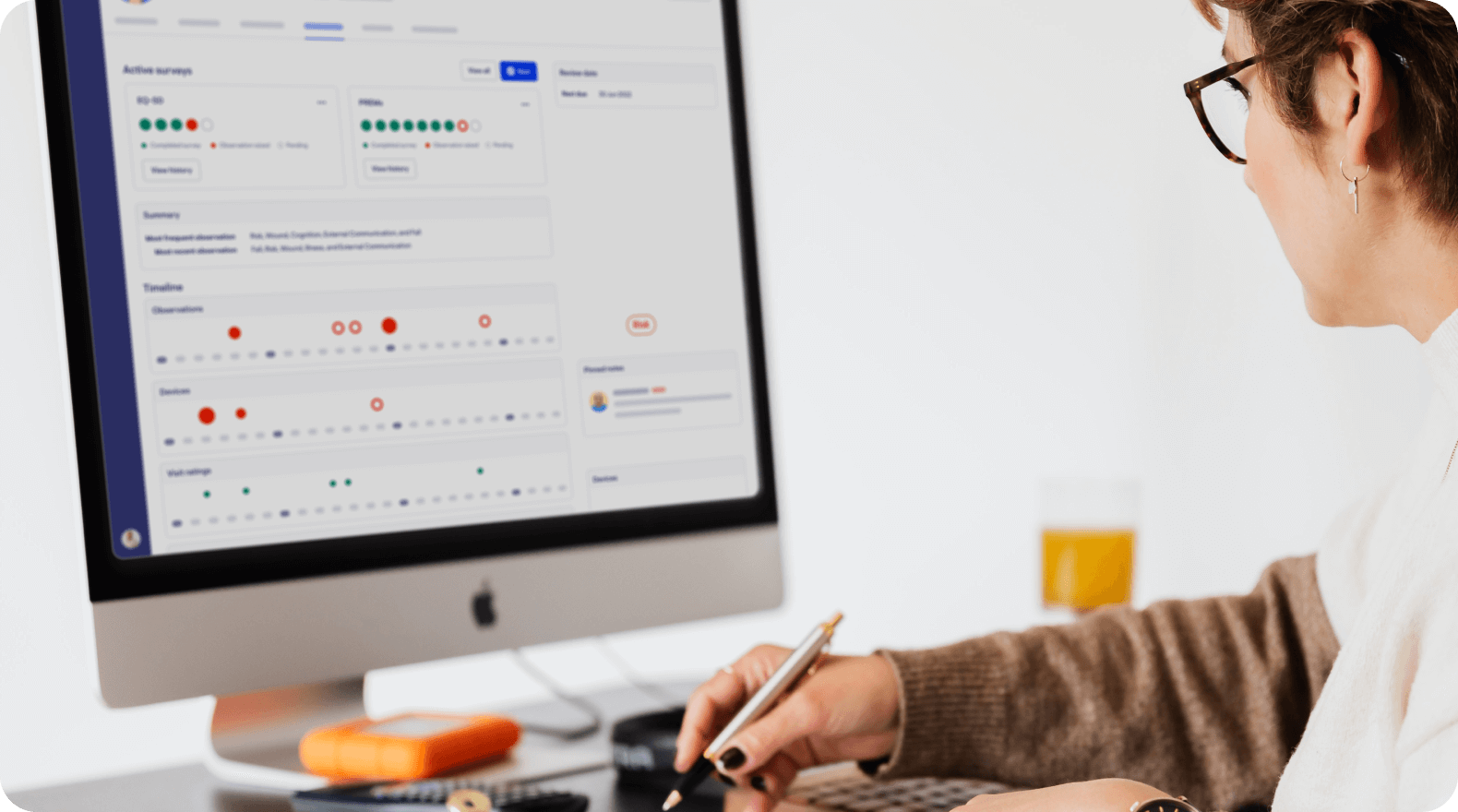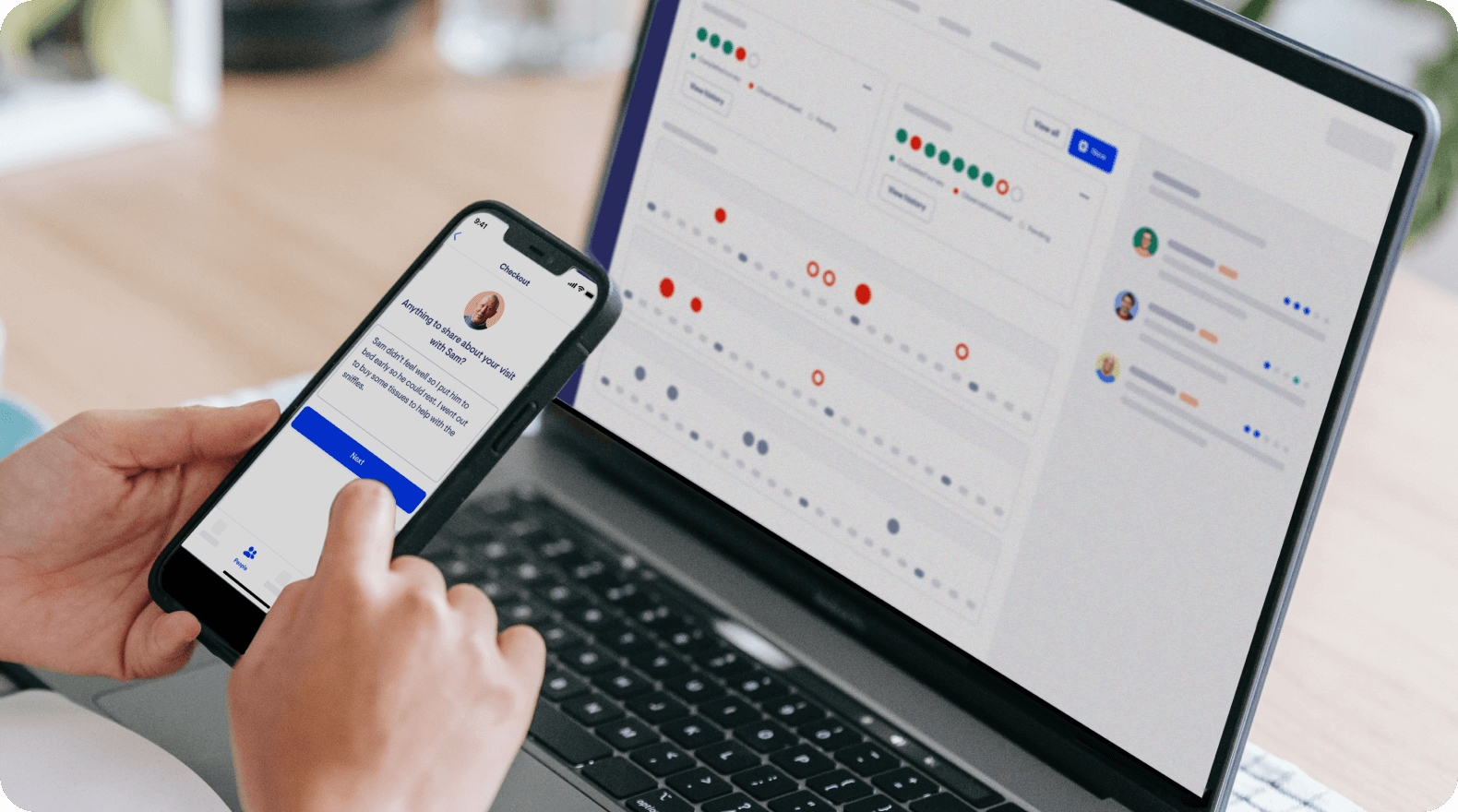Customer interview
Affinity Senior Care.
Renae Armstrong, CEO, owner and 'Chief of Everything' for Affinity Senior Care


“I genuinely am surprised that for the price we pay per month, we get the amount of features that we actually get. It punches well above its weight in terms of affordability and what it actually delivers. It's a lot of functionality that you'd expect with the big guys, but a price point and ease-of-use that makes it accessible to the small guys as well.”
Renae Armstrong,
CEO, Affinity Senior Care
Service areas
Brisbane North and Moreton Bay regions
Care provided
Aged care, HCP, and Private
Website
affinityseniorcare.net
Number of staff
Boutique community care provider
Learn why Affinity Senior Care’s CEO is a fan of Lookout and believes it is a beneficial platform for all home care providers - big and small.
Running a values-based, high-quality, and close-knit home care service is of the utmost importance to Renae Armstrong, CEO, owner and ‘Chief of Everything at Affinity Senior Care - which operates in Queensland’s Brisbane and Moreton Bay regions.
Having a lengthy career in the care sector, and a significant passion for delivering high-quality aged care services, Renae is a wealth of industry knowledge and perspective, which is evident in the interview below.
Read on as Renae shares why Lookout was chosen for Affinity Senior Care, the benefits achieved since making the choice, and what it is going to take as an industry to deliver a brighter future in the aged care sector.

About Affinity Senior Care
I established Affinity Senior Care to deliver the kind of care that we thought the clients were looking for in the community. I started it after working in the community care industry for a very long time and having an appreciation of the kind of things that clients were wanting. I'm a registered nurse, have postgraduate qualifications in palliative care, and was a clinical nurse consultant.
[At Affinity Senior Care] our values [have the acronym] PARIS, which [stands for] ‘Partnership’, Accountability, ‘Respect’, ‘Innovation’ and ‘Satisfaction’.
[One value that is really important to us in particular] is ‘partnership’....and that's not just partnership with our clients, but it's also partnership with our workforce. [PARIS] starts with partnership and ends with satisfaction - it's [not only] about our clients being satisfied, but also our workforce being satisfied. Especially now given the current problems that we are facing with workforce sustainability and finding the right people. We have always had the philosophy that if our partners, our workforce, is happy, then they will deliver good care to clients.
Alternatives to Lookout
I [have] used various other systems.
Procura was probably the worst because it wasn't intuitive and it seemed to be horribly complicated. If you didn't really understand it, it could easily go wrong.
There was another that was really complicated again. [Particularly for] nurses and care partners, [who] just wanna actually deliver hands-on care - so having a complicated system that's too complex [for even them to use] …well, it just really detracts in lots of ways, particularly from workplace satisfaction. If you feel like every time you have to do something it's complicated, you're less likely to want to do it. You're less likely to be happy doing it.
[There] was another one where the financial part for managing Home Care Packages was horrendous. It was designed in such a way that even when we trained other people on that particular system, including myself and some of the other care managers, it was very hard to remember the nuances of the system and how we had to enter financial information for it not to come out well. And then, if we made a mistake, it was very hard to get hold of tech support to correct it and figure it out. Again, you lose a lot of time doing things with a system when it is complicated.
“The primary thing(s) for us was it had to have really good functionality, and it had to be user-friendly.”
Also, I have been in organisations where they have missed a lot of money because [the system] was complicated. People didn't know how to use it, so it didn't get done properly. Then when you dig into it, you suddenly realise, we are missing all these payments or we've overpaid things.
Then there was another system that I used right before we came to Lookout. It was great, but it just didn't have enough features. It would hold client information, but it wasn't helpful in managing the workforce - it didn't have enough flexibility in storing information related to our workforce. In terms of budgets, it did home care package budgets well, but if you had a private client or some other financial arrangement - it wasn't easy to manage that outside of the Home Care Package environment.
There are also some big systems out there that are great, but honestly how [do] those businesses can bear the costs of those? Plus, they are complicated to use.
[I’ve also worked in businesses with minimal technology] where you had to have the care plan typed and put in somebody's home.
The consideration process
When choosing a new care system for Affinity Senior Care, I looked at a huge number of systems. I sat on lots of PowerPoint presentations and did lots of trials with different people.
The primary thing(s) for us was it had to have really good functionality, and it had to be user-friendly. If it's not user-friendly, we don't capture data and information well - and in this particular industry, where compliance and meeting legislative requirements is [paramount], that was really important.
The last thing [in addition to so functionality and ease of use] was affordability. Affordability was a high priority because we're in an industry that’s not worth a fortune - we don't want to be passing on high costs to clients. At the end of the day, we want to have our infrastructure be as affordable as possible so that we can focus on spending money on care delivery and services that support that client's actual needs. So Lookout ticked all of those boxes.
User-friendliness
If a system is complicated, people will start avoiding it or they won't use it properly. And if they start avoiding it and not using it properly, then what good is it to you? Because then you can’t actually rely on what the system contains. That's what I think is really good about Lookout …. it's [just so] easy to use.
I have just never used a system that's so user-friendly. Now that I fully understand the system, training other people on the system is not complicated at all. We could bring on a care manager tomorrow and it would be very easy.
In comparison to other roles in other businesses that I personally have had, [Lookout] has easily cut down the time I spend trying to figure things out by something like 75%.
Value
I genuinely am surprised that for the price we pay per month, we get the amount of features that we actually get. It punches well above its weight in terms of affordability and what it actually delivers.
It's a lot of functionality that you'd expect with the big guys, but a price point and ease of use that makes it accessible to the small guys as well.
I think [Lookout is] what our industry needs. Top-notch fantastic systems that are actually affordable for our clients.
Onboarding and support
[During onboarding], every time I had a question, somebody went off and found the answer, and got back to me extremely quickly. I wasn't used to that kind of a fast turnaround so I was actually pretty impressed how quickly people got back to me to show me what I needed to do.
[In regards to support today], I haven't seen a system or used a system that is actually so well supported. It gives me great peace of mind knowing that whatever I want to know is easily accessible.

Tickets
When you are working with lots of different clients, handling a lot of information, it is very easy to think that you've done something for somebody. But you may not [have], [even if] you think you did it.
[In Lookout,] I think tickets [are] really important. We love being able to put [tickets] into Lookout to make sure that our care is comprehensive and that we don't just think we did it, we know that we actually did do it.
I love the fact that you can have tickets with to-do lists, [to] keep you on track, [to] minimise the gaps, [and to help] makes sure we've set things up.
“Tickets help us make sure that when you're not seeing a client every day, you are still able to minimize the gaps and the risks...”
We also use tickets for capturing documentation. If we want to follow up on incidents, we use tickets. If we have a particular concern we'll create a ticket to say ‘this is the action that we are following through at the moment’.
Tickets help us make sure that [when] you're not seeing a client every day, you [are still able to] minimize the gaps and the risks…. and you are less likely to miss something.
[Tickets is something] that we think that Lookout does really well.
Compliance and Governance
We use [tickets] to do a lot of our governance as well - when we start exploring and investigating a concern about a client we have, [it outlines the] risk that we've identified, and what have we done to address it. [Within each ticket], there are [records of] certain tasks and certain things we've had conversations about, information that we've shared, and activities that we've completed.
So when the accreditors come in [to investigate if we] were following up an incident or if a client was discharged from hospital, we need need to make sure they made a visit to go to the GP, we received the discharge summary, their medications are up to date and they've understood everything that the hospital has told them. With Tickets, you can see who's followed up what, who's who, and if anything has been missed.
For your aged care accreditation, for your quality, for your clinical governance, this system manages all of our requirements to meet the standards that we are trying to deliver above and beyond.
Dashboard
On the dashboard front, that helps a lot with governance, governance meetings and all the things you need to do at the management level. The dashboard is fabulous and it makes the day incredibly easy.
Verifications
When you're working with lots of businesses and lots of business partners, it's very important [that we] make sure that we have got the right up-to-date information through the verifications and compliance systems. Making sure that their insurance, public liability and professional indemnity [is up to date], and if they're an allied health business, that we've got the right records for their registration.
[In Lookout,], we can actually set up the verifications according to what we want to see from our partners to make sure that they are only getting services from good high-quality care organisations. If something's about to expire, like a police check, a registration, or insurance - I love the fact that the system doesn't just tell you at the last minute, it tells you many days out… 90 days plus in some cases. It lists on your dash dashboard what might be expiring, so you've got plenty of time to chase people up for your compliance documentation and you can stay on track.
“The fact that the care partner can look on their phone and can read [up-to-date] information about the client is absolutely brilliant.”
We take [verifications] really seriously and we would never allow somebody to go into a client's home unless we had done all our verifications and checks- ensuring they were the right safe, high-quality people to be partnering with. [For example,] I contacted one partner and told her that I needed her updated car registration. She didn’t realise it was about to expire… but we did because of our system.
Care management and continuity of care
Our model of care is [that our] clinical partners can choose how many clients they wish to manage and can design their workload so that they can be full-time or part-time, or just occasional… but they are then responsible for everything to do with that client circle of care. [They] love Lookout because they can hop [into the system] and be able to see and do everything that they need for a client ….and their circle of care is so transparent and accessible to them.
The fact that the care partner can look on their phone and can read [up-to-date] information about the client is absolutely brilliant. That is so good in terms of informing them, and [the clients] love it as well.
In big organisations, if you don't have the kind of model [and system] that we have, you might have three different nurses seeing the client, and one thing that annoys the client is when three different people keep asking them the same thing all over and over again…. with Lookout you don't need to do that!
Matching functionality
It's not just about the clients, they are obviously extremely important, but our workforce, our partners, [are also] extremely important. [So], matching is incredibly important…it's about having the right plant clients match to the right partners, which is one of the reasons we like Lookout.
[Lookout’s] system actually lets you tick off the values that the client actually wants. [You can also match on] background, interests, languages, and especially culture.
[Also] it’s the simple stuff like the sharing of interests, bios and little pieces of info. Having that information and being able to share that information with the clients so that they understand a little bit about the partner's interests.
Finance functionality
Having used other [more complicated] systems, it really made me excited that it is so easy to manage [the financial side of] all the different partnerships that a client might have. I was just so impressed at how easy it was to manage the billing, to match invoices, and then to translate it to zero. I have been in organisations where they have missed a lot of money because it was complicated.
Lookout simplifies the way that you manage financial transactions on behalf of the clients. They can access their own transactions and account summary records, anytime they want. They can ask you any questions that they might have and see what the progress is on the account. It's really good to be able to have that data so easily to hand, to be able to sit down and have a conversation with a client… particularly clients who want all extra services and are ok to overspend and pay privately.
[Lookout’s finance capabilities are] not just [great for] HCP, but for our private clients as well. It's very impressive in terms of its versatility. You can use it for HCP clients but it's certainly easy to adapt for a fee-for-service client or for a family that might be prepared to spend X amount on mom and dad.

The client and worker apps
Some of the clients are great with the technology [and so benefit from the app], but some of them are not so great [with technology]. [However,] we can still do printed-off documents in the home if that's what the client wants.
For our care partners, it is great that they can actually check in [on their app], see [all key and useful] information, and it's also so easy for them to provide us with feedback and leave notes.
The fact that [we can issue] ‘should knows’ and the ‘must dos’ [through the worker app]... we think that's pretty terrific. [As] when [our care partners] check-in and go to see a client, they are reminded of what they should know and they must do - it's a great way [to] communicate and it makes sure that we are not missing things. Like, can you please check the client's weight? Can you please check what [the client] had for dinner last night? It’s really helpful because sometimes when you talk to people, and they're busy, and it’s not written down - [so] that conversation can disappear.
Remote care monitoring
The right system really does save lives [With Lookout], I've just been incredibly impressed. I've not seen anything this smart. [In the checkout notes] if the care partner writes a particular trigger word, the AI sends through an email to the care manager - and sometimes they are spot on. I think the AI is fabulous. I love the iBot and the little messages that the AI that's built-in, I mean it's highly helpful, it's amusing, and it's wonderful to have it. All of that facilitates what we're trying to achieve in terms of governance and oversight for our client community.
In one organisation, we actually employed nurses who spent a large part of their day just reading notes to try and identify if the support workers had found something they’d forgotten to tell somebody. Now we don’t even have to worry about doing that because [Lookout’s] AI system actually does that. Plus the fact that you've got the star rating for when the support worker checks out, you've got different ways that you can actually identify problems without actually needing a workforce to sit and read notes anymore.
“[With Lookout], I've just been incredibly impressed. I've not seen anything this smart.”
One client also had a remote monitoring device that was getting fed into Lookout. The AI bot alerted that the client's heart rate was, was sitting around 120, 130. It was unusual, as a care partner went into the home and the client wasn’t complaining or feeling unwell or sick. Regardless we got them to the doctor’s surgery and they had him start on heart medication immediately. This is something that could have gone completely unnoticed - even though the care partner did all the right things, and put [the right] information in - so [Lookout] does save lives and it does improve health outcomes for clients.
In the community, people aren't usually that sick, but suddenly they can [become] really quite unwell… and before you know it, the information that [Lookout] prompts helps you be reactive. Health information is key, and [so is] knowing when something's important. [Lookout] gives you peace of mind to know that it is working in the background.
Security
[As a care provider], you've got to actually make sure that that client information is secure. And I do love the multi-factor authorization of Lookout …that it's all nice and secure.
Thoughts on built by care, for care
I'd heard of Five Good Friends and I’d heard of the Lookout Way. Initially, when I came across Lookout, I thought it was just for Five Good Friends… and there was a degree of confusion for me in figuring out if one was related-to or separate-from the other.
Eventually, through the exploratory process, we realised Lookout was actually available as a separate option. The fact that it was developed by Five Good Friends, who have a great reputation and provides a good service, was a plus. It met the requirements for them, and it certainly met our requirements!
One thing I'd really like to say to other [care providers] in the marketplace, is to look at what your competitors are doing… [and] look at what they are doing well. It’s important that we actually learn from each other. At the end of the day, there are enough clients out there that need our help!
This is still an industry with a lot of capability. When I see people in the industry, like the people behind Five Good Friends, the people who've developed Lookout, it's just such an encouragement for me to know that I'm not the only one that's passionate about the industry….there are other people that are trying to make a difference.
Evolution of the platform
It is very important to have a platform with evolving capabilities. I know that Lookout will continue to evolve very positively and very favourably for our business… [and] we've seen it evolve in the time that we've been with it. [It’s a big] advantage to other organisations adopting this system.
Ending words
The right system really does save lives and I just want to see people in the community getting good care.
What I would say to other businesses is you really want something that is user-friendly, and contains as much information that you think that you would need to draw from for a variety of reasons.
For the team at The Lookout Way, I'd just like to say, well done.
Not only do you provide a great tool, something that really serves us well, but you inspire us to want to be as good as your software is.

Discover how Lookout can transform your care business.
